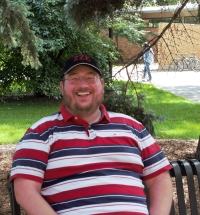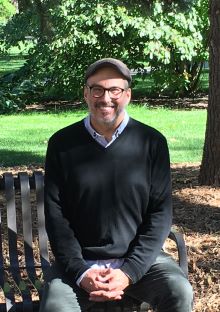Graduate Consultants
Kristina Caton

I come to the Center for Writers with a background in teaching and an emphasis in teaching and composition. My B.S. is in Early Childhood Education from New Mexico State University and my M.A. is in English from North Dakota State University. For several years I worked as a disciplinary consultant for the College of Human Development and Education. As a disciplinary consultant I worked with graduate students and faculty on a variety of initiatives from NSF-GRFP grand proposals to developing writing rubrics for disquisitions. Now, as a generalist writing consultant I work with graduate students and faculty across the university in one-on-one, workshop, and classroom settings to support both writing and writing instruction.
I think that one of the best aspects of being a writing consultant is trying to demystify the writing processes-perhaps through explaining a point of grammar or diagnosing a problem with "flow." And, while writing, especially academic writing, is complex and can be frustrating and overwhelming, it is also incredibly important to us as students, faculty, and an institution.
Drew Taylor

Our Engineering Specialist, Drew Taylor, is a doctoral student in Electrical and Computer Engineering, and, unsurprisingly, believes engineers can make the best writers. Graduate writing often involves finding model papers within one’s discipline, deconstructing them to discover what moves the author is making to appeal to their readers, then emulating those moves to match the readers’ expectations. This process is analogous to many parts of design that engineers know well, though in very different contexts, so Drew sees himself as a mediator between the procedures that engineering students are already familiar with and the conventions of writing that they may not yet be familiar with.
Another common aspect between writing and engineering—and research in general—is project management. While all our graduate consultants are practiced writers, they are also experienced researchers, and Drew believes a similar balance should be struck in academic writing: the research—the facts, the observations—must be accompanied by the story, the expert opinions of the researcher of how every small piece relates together to create concentric layers of meaning. Every manuscript is a sales pitch to its readers, who must pay an opportunity cost of doing anything else to read and understand it, and as interesting as the data may be to the author, the story of the research is what will make the work accessible and memorable to its reader.
Nick Humphrey

Nick is a Ph.D. candidate in Emergency Management and Disaster Science. He has been a Graduate Writing Consultant with the Center for Writers since Fall 2022. He is a general consultant, working with individuals of different backgrounds and fields, such as agriculture, music, and computer science. His approach is to make new clients feel welcome to the Center and be able to share their work and experiences writing. Nick assists clients in everything from fine-tuning a mostly finished product, to teaching how to organize sections, as well as brainstorming. His goal is to help clients leave the Center feeling accomplished and having learned something new.
Isaac Rush
Isaac is an evolutionary and morphometric biologist working on his Ph.D. in biological collection sciences and his teaching certificate focusing on museum-setting education. He is the writing center’s Graduate RaMP Consultant, helping bridge between undergraduate and graduate education. He is particularly skilled at assisting in preparing application material, for example grants, fellowships, proposals, and other academic applications. His goal is to help students work through and develop their skills in their writing, rather than being an editor. He believes clear communication in writing is important in any field; research can't advance if you can't effectively communicate your study and findings. Often it helps to just sit and have a conversation about your ideas or what you are having trouble with. Don’t be afraid to seek help, whether that be from your advisor or a writing consultant. Consultants are always seeking new and more effective ways to help students, so Isaac is learning alongside the students he consults.
Shikha Phillips

If there is one thing anyone should learn about writing, it is, that it’s a process. Many writers back track or become discouraged when their first draft doesn’t end up meeting their expectations. Academic writing is a process. It takes the creative power of brainstorming, writing, reviewing, editing and re-writing that refines a manuscript and results in the finished product, accurately conveying what the writer originally sought to convey.
Shikha Phillips is a graduate writing consultant at the Centre for Writers catering specially to students from Agriculture and related fields. She has experience in academic and research writing with practical understanding of research paper outlines, citations and reference styles in the most sought-after journals in the agricultural and food science areas like Journal of American Society of Agricultural and Biological Engineers (ASABE) and Computers & Electronics in Agriculture.
Shikha enjoys writing and has a passion for helping her clients through the writing process so that they can see their research manuscripts as comprehensive works in progress, on their way to becoming articulate scientific literature.
Shikha’s tip to writers would be to trust the process and to not be afraid to revisit and manipulate the structure of their writing to best meet their research and academic writing goals and requirements.
Troy Reisenauer

Hi, I'm Troy. I grew up on a ranch near Dickinson, North Dakota. Raising horses, cows, and chickens was not my passion, so I left the dusty West for the greener, if flatter, fields that are home to Minnesota State University Moorhead. I graduated from MSUM with a bachelor's degree in history and Russian studies. I then decided to to pursue graduate studies here at North Dakota State University. At NDSU, I earned a master's degree in twentieth-century European history and am currently working on a PhD in that same field. My dissertation focuses on the Australian writer, Joseph Roth, who lived and worked in Vienna in the post-WWI period. As a consultant at the NDSU Center for Writers, I love working collaboratively with fellow graduate students in the writing process. I firmly believe that anyone can become a better writer!


